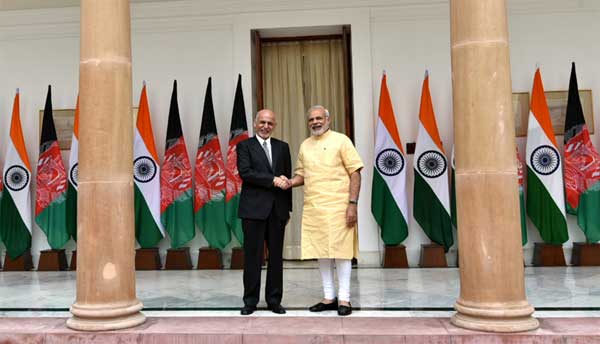New Delhi, Sep 15 Without naming Pakistan, India and Afghanistan on Wednesday expressed grave concern over terrorism in the region while New Delhi extended Kabul $1 billion in aid for capacity and capability building.
Briefing the media following bilateral talks between Prime Minister Narendra Modi and visiting Afghan President Ashraf Ghani, Foreign Secretary S. Jaishankar said that a large part of the discussions was devoted to the challenge of terrorism.
“The two leaders discussed the regional situation and expressed grave concern at the continued use of terrorism and violence in the region for achieving political objectives,” he said.
Ghani arrived here on Wednesday in what is his second official visit to India after the one in April 2015.
A joint statement issued following the talks said that the two leaders agreed that terrorism “presented the single biggest threat to peace, stability and progress in the region and beyond”.
“Stressing that elimination of all forms of terrorism, without any discrimination, is essential, they called upon the concerned to put an end to all sponsorship, support, safe havens and sanctuaries to terrorists, including for those who target Afghanistan and India,” the statement said.
“Both leaders reaffirmed their resolve to counter terrorism and strengthen security and defence cooperation as envisaged in the India-Afghanistan Strategic Partnership Agreement.”
According to Jaishankar, Ghani pointed out that this new wave of terrorism was supported by the narcotics trade and that it was very well funded.
“The thrust of the discussion was that today this wave of terrorism is actually a common regional problem,” the Foreign Secretary said.
India also pledged $1 billion for the support and development of “a unified, sovereign, democratic, peaceful, stable and prosperous Afghanistan”.
Jaishankar said that much of this new development aid would cover capacity and institutional building.
“There was some discussion on water management and more collaboration on smaller dams,” he said.
In June, Modi and Ghani jointly inaugurated a mega dam that was reconstructed with Indian aid in Herat province of Afghanistan.
Jaishankar also said that India was ready to deliver 1.7 lakh tonnes of wheat to Afghanistan but there have been transit problems.
He said that a transit request has been made to Pakistan but there has been no reply from Islamabad.
“Both leaders welcomed intensification in the interaction involving India and Afghanistan with regional and other countries and international organisations to foster peace, stability and development in Afghanistan,” the joint statement said.
The two sides also discussed quick implementation of the trilateral agreement involving Afghanistan, India and Iran, signed in May 2016, using Chabahar port.
“They appreciated, in particular, the outcome of the India-Iran-Afghanistan trilateral consultations and looked forward to the resumption of India-US-Afghanistan consultations in New York later this month,” the statement said.
According to Jaishankar, at the India-US-Afghanistan trilateral on the sidelines of the UN General Assembly, “we expect a political, economic, security discussion”.
Modi and Ghani also discussed the ministerial conference of the Heart of Asia – Istanbul Process on Afghanistan’s development to be held in Amritsar on December 4 and the Brussels Conference on Afghanistan to be held on October 5.
To be hosted by the European Union and the Afghan government, the Brussels conference will be attended by up to 70 countries and 30 international organisations and agencies.
Following Wednesday’s bilateral talks, India and Afghanistan exchanged agreements on a mutual legal assistance treaty, for peaceful uses of outer space and an extradition treaty.
The documents were exchanged in the presence of Prime Minister Modi and President Ghani.
The Union Cabinet had on Monday approved the inking of an extradition treaty between India and Afghanistan.
The treaty would provide a legal framework for seeking extradition of terrorists, economic offenders and other criminals from and to Afghanistan.
Wednesday’s was the eighth meeting between Modi and Ghani.
